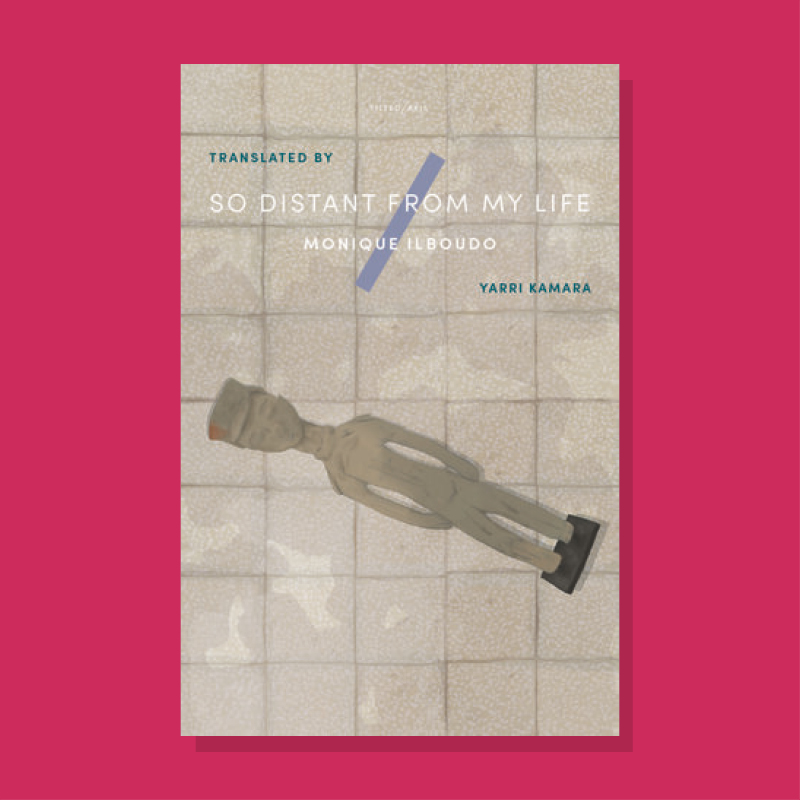
Tilted Axis Press has had a great year. Three titles longlisted for the 2022 International Booker Prize – Sang Young Park’s Love in the Big City, Norman Erikson Pasaribu’s Happy Stories, Mostly, and Geetanjali Shree’s Tomb of Sand – the latter of which eventually won, becoming the first Hindi novel to nab the most coveted prize for international translated fiction. Established just seven years ago, Tilted Axis Press is a small non-profit publisher supporting the translation of Asian writers “into a variety of Englishes.” I’m very grateful to the International Booker Prize for introducing me to such pivotal independent presses. This one feels especially significant as its founder, Deborah Smith, noted translator of contemporary Korean literature, translated Han Kang’s unsettling The Vegetarian, which won the 2016 International Booker Prize and converted me, fervently, to the world of international translated fiction.
So Distant From My Life (originally Si loin de ma vie) is the first African title from Tilted Axis Press, and is a novella by the Burkinabè author, politician, human rights advocate, diplomat, professor, just all-around superhuman, Monique Ilboudo. Among her laurel of firsts (first woman to publish a novel in Burkina Faso, first woman to teach law at Ouagadougou University), she was a pioneer in centering societal and civic research on women’s rights and conditions in Burkina Faso, from her column Féminin Pluriel in the Burkinabè newspaper L’Observateur Paalga in the early to mid-1990s to the 2006 essay volume Droit de cité: être femme au Burkina Faso on the many social, cultural, and political obstacles that Burkinabè women still face. While Ilboudo notes that her “work always comes back to the women’s struggle,” So Distant From My Life’s focus on masculinity, sexual orientation, and migration is a litmus test for both the author and a country where LGBTQ+ people are not criminalized, but also not fully socially accepted.
Despite our natural inclination to assign the location of the story to Burkina Faso, Ilboudo notes that this fictional country would be more reflective to the shared experiences of all of the Sahelian countries (the very city of Ouabany is a portmanteau of West African capital cities of Ouagadougou, Bamako, and Niamey). The premise is simple yet familiar: a young man, Jeanphi, disillusioned by the insufficiencies of his life is motivated to migrate, fails after multiple attempts, starts work for a French philanthropist, then anticlimactically relocates to France almost in exchange for his labour and identity, returns home with similar philanthropic endeavours, and confronts a society whose stagnant mentality truncates this homecoming.
Looming over the text is the spectre of international development, a character in itself. It is important to note that this story is set in the early 2000s when the NGO-ization of public infrastructure in postcolonial societies was fecund for Western do-gooders. It is interesting that although we are now used to the outrageous mishandling of funds by charitable organizations, white savior types imagining hordes of smiling children blanketing their arrivals with gratitude and laughter, and the irony of humanitarian aid leading only to further poverty, the attitudes towards and calls for international development during the impressionable aughts were insatiable and cultish. Was there any high schooler who wasn’t keen on going to Africa to build a (insert the blank)? Were there any proclamations of human rights crusading that weren’t masking a sick form of smug self-righteousness? Did no one else side-eye or groan when a pair of overeager brothers went from city to city forcing stadiums of young people to stand up, wave their hands in the air, and chant about change?
It was a delight to read the distrust so clear even then in Ilboudo’s story, on these efforts to “develop” and “modernize” Africa. In response to the multitude of education institutions funded by European philanthropists in Ouabany, Jeanphi asks, “Were they to educate or to make profit?” and then immediately, as a matter of fact, follows with “the answer, as is often the case, depended on the individual and how much faith they placed in humans or in capital.” That fire lit within Jeanphi to leave was fanned by the impetus of “[refusing] to be a collateral victim of International Monetary fund structural adjustment programmes.” After returning to Ouabany, now for his own philanthropic endeavour to convince his peer youths not to migrate, Jeanphi laments how his society still “hoped for the providential man who, like the Messiah, would finally lead them to the promised land of development.” It’s difficult to not find parallels in these criticisms and Ilboudo’s own personal and professional trajectories. Sent to Europe to further her studies, Ilboudo felt compelled to return, to rebuild, by duty.
I so wished that this story was more gradually explored in a novel. At 127 pages, every scene felt like a sketch. There are two critical moments in the story where a glance elicited so much turmoil in Jeanphi. The first when he attempts to take advantage of a white businessman whose gaze stirred up so much disgust, Jeanphi’s corporeal reaction had to be tempered by an existential need (“I detested him, but I detested the poverty I eked out a living in even more.”). The second was the same gaze, this time from his employer, benefactor, lover, and later husband. It’s not clear from the text whether Jeanphi is gay, or if homosexuality was weaponized by Elgep, his husband, as it was later by the street kids in Ouabany. This relationship and Jeanphi’s sexual identity seemed to be glossed over, which, if analyzed further, would have added so much depth to the experiences of racial and economic inequalities. As it is though, Ilboudo’s readership in Burkina Faso have already noted discomfort with gay characters in the book.
What really made this book memorable was listening to Yarri Kamara speak on her experiences with the translation. Kamara is East African, and spent nearly two decades living in Burkina Faso, before moving to Italy. She works mainly as a technical translator, and So Distant From My Life is her first work of literary translation. It was great to get insights into African culture (the expectation that young males travel and that experiences elsewhere are milestones in personal development), the African publishing and translation ecosystem (“embryonic” publishing sector in Burkina Faso), and the author-translator relationship (Kamara had walked up to Ilboudo at the original book launch to ask about translating).
True to Tilted Axis Press’s mandate of translating into “a variety of Englishes,” Kamara’s considerations for the variety of French dialects and wordplays and how their transfer to East African and West African English counterparts (she often bounced ideas off of her Nigerian friends) were enlightening. The passage in the book where Jeanphi contemplates his leaving of Ouabany emphasizes the role of personal agency in relocating found in the French verb s’expatrier, whose English counterpart “to expatriate” obscures the reflexive morphology. This fully establishes the role of movement, of coming and going, as ones of control, and who, by the fruits of neoliberal progress, have it.
This book was the January 2023 pick for the Borderless Book Club. Borderless Book Club meets every third Thursday of the month via Zoom, and is hosted by its founder Maddie Rogers. It was created in March 2020 as a community to support small presses, international literature, and translators and authors when the pandemic first shut down many cultural events and organizations. It was superb to have Yarri Kamara, translator of So Distant From My Life, join the January call and discuss her translation methodologies, illuminating for us the work of those who help make stories more accessible to the English-speaking and reading world.
— Sarah Wang, Programming Coordinator
